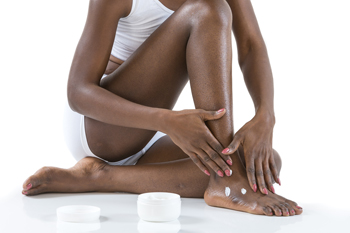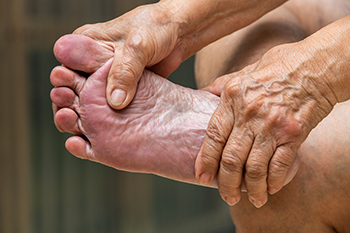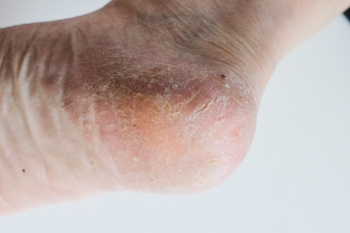March 2024

Running injuries can affect the feet, and it is beneficial to implement effective running injury prevention strategies into your fitness regime. Strengthen muscles and joints with core stability, leg strength, and balance exercises. Avoid increasing mileage or intensity too quickly to let your body adapt and minimize overuse injuries. Mix up your routine with cycling, swimming, or yoga to prevent overuse injuries and fortify various muscle groups. Listen to your body and prioritize rest days and adequate sleep for tissue repair and muscle recovery. It is helpful to invest in proper running shoes and gear to support your biomechanics. If you are interested in learning about additional running injury prevention techniques that can protect your feet, it is suggested that you confer with a chiropodist.
Although running is a wonderful exercise to keep you in shape, it can wreak havoc on your feet and ankles if you don’t take preventive measures. If you have sustained a foot and ankle injury from running, please consult with one of the chiropodists from The Footcare Centre. Our chiropodists can help you maintain the health of your lower limbs and your mobility.
Some common running injuries include:
Achilles tendonitis
Shin splints
Ankle sprains
Stress fractures
Plantar fasciitis
Bursitis
What causes injuries?
These injuries are usually caused by overtraining, wearing the wrong shoes, running on hard surfaces, having tight and inflexible muscles, or having biomechanical issues in the feet or ankles.
What can I do to prevent injuries?
Train slowly and gradually
Give yourself plenty of time to recover following a run
Wear shoes that fit properly and support your foot
Avoid running on hard surfaces, like concrete
Stretch and strengthen the muscles of your lower legs
Warm-up prior to a run
Have your gait analyzed and your feet examined by a chiropodist to determine if there are any biomechanical problems that need to be treated
If you have any questions, please feel free to contact our office located in . We offer the newest diagnostic and treatment technologies for all your foot care needs.

As spring emerges, it is the perfect time to revitalize your foot care routine and prepare your feet for the warmer days ahead. Begin by indulging in a thorough foot soak to cleanse and rejuvenate tired feet, using gentle exfoliation to remove any lingering winter dryness. Transition to lighter, breathable footwear to promote air circulation and reduce the risk of moisture-related issues. Keep toenails trimmed straight across to prevent ingrown nails and invest in comfortable, supportive shoes for outdoor activities. Embrace the beauty of spring blossoms during walks, but be mindful of uneven terrain to avoid potential injuries. Hydration remains key, so moisturize your feet regularly to maintain softness and suppleness. If you are seeking help with foot care, it is suggested that you make an appointment with a chiropodist.
Springtime is the season that many people use to get back into exercising and sports. It’s also a time when foot and ankle injuries may be more common. If you have a foot or ankle injury, please consult with one of the chiropodists from The Footcare Centre. Our chiropodists can help you maintain the health of your lower limbs and your mobility.
Common Foot and Ankle Problems in Spring
Plantar fasciitis
Achilles tendonitis
Shin splints
Strains
Sprains
Fractures
And more
Avoiding Injury
Increase physical activity slowly and gradually
Wear comfortable, well-fitted shoes and socks
Take time to rest following a workout
Recognize and treat any injuries promptly
Treatment at Home
Rest the injured foot
Apply ice to reduce swelling
Compress the injured foot with a bandage
Elevate the foot to prevent swelling
Serious, chronic, or particularly painful injuries require medical care by a professional. If you have any questions, please feel free to contact our office located in . We offer the newest diagnostic and treatment technologies for all your foot care needs.

As we age, it becomes increasingly important to pay special attention to our overall health. Sometimes our feet are overlooked despite the important role they play in our daily lives. Senior citizens, in particular, may face unique challenges when it comes to foot care. Proper foot care is essential to maintain mobility and prevent potential issues. Regularly inspecting the feet for cuts, bruises, or changes in color is a simple yet effective practice. Choosing comfortable and supportive footwear can alleviate discomfort and reduce the risk of developing foot problems. Keeping the feet clean and dry, especially between the toes, helps prevent infections. Additionally, gentle exercises, like ankle rotations, can improve circulation and flexibility. By incorporating these foot care practices into their routine, seniors can promote overall well-being and enjoy an active lifestyle with happy and healthy feet. If you are elderly or are caring for a senior citizen, it is suggested that you consult a chiropodist for additional tips on elderly foot care.
Foot problems can become increasingly common as we age, making everyday foot care especially important. To learn more about maintaining proper foot health, please consult with one of the chiropodists from The Footcare Centre. Our chiropodists will assess your condition and provide you with quality foot and ankle treatment.
Common Foot Problems
Certain foot problems may be more likely to affect older adults.
Some examples of foot conditions that can be common in older adults include:
Dry, cracked skin
Calluses and corns
Blisters
Ingrown toenails
Deformities such as bunions or hammertoes
Fungal infections
Plantar warts
Systemic conditions, such as diabetes or arthritis, are also more likely to affect older people and manifest symptoms in the feet and ankles.
Daily Foot Care Tips
Having a daily foot care routine can help detect problems early on and prevent future issues.
Things that you can do at home to care for your feet include:
Washing the feet daily with warm water, drying them thoroughly, and then applying a moisturizer
Trimming the toenails straight across and not too short to prevent ingrown toenails
Performing daily foot exercises to improve foot strength and mobility
Wearing shoes when walking to avoid injury
Inspecting the feet daily for any cuts, scrapes, sores, or other abnormalities and seeking prompt treatment if any problems are discovered
If you have any questions, please feel free to contact our office located in . We offer the newest diagnostic and treatment technologies for all your foot care needs.

Cracked heels, though often dismissed as a cosmetic issue, can have far-reaching implications for your overall health. These fissures, resulting from dryness and thickening of the skin, not only cause discomfort but can also create an entry point for bacteria and fungi. Left untreated, cracked heels may lead to infections, including cellulitis, which can spread rapidly and become life-threatening if not addressed promptly. The pain and discomfort associated with cracked heels can affect your gait, leading to changes in posture and alignment that may contribute to musculoskeletal issues over time. Additionally, cracked heels can hinder your mobility and quality of life, making it difficult to engage in daily activities comfortably. If you have cracked heels, it is suggested that you visit a chiropodist who can successfully treat this condition, which may include prescribed medication.
Cracked heels, also known as heel fissures, can cause pain and discomfort. If your cracked heels are bothering you, please consult with one of the chiropodists from The Footcare Centre. Our chiropodists will assess your condition and provide you with quality foot and ankle treatment.
Dry, thickened skin around the rim of the heel is typically the first sign of cracked heels. While this condition is common and usually just a nuisance, some cases can be more severe. If left untreated and as more pressure is placed on the heel, the cracks become deeper and eventually walking and standing can be painful. These deep cracks or fissures can bleed and also become infected. Those with diabetes need to be especially careful as fissures could lead to diabetic foot ulcers.
Causes
Cracked heels can be the result of several different factors, including:
Dry skin
Taking long, hot showers or using harsh soaps
Standing for long periods of time
Walking barefoot
Walking in shoes with an open back, such as sandals or flip flops
Wearing shoes that do not fit properly
Living in a cold or dry climate
Certain skin conditions, such as eczema or psoriasis
Treatment
There are many at-home treatment remedies for cracked heels. Applying moisturizers to the heel can help hydrate the skin. Soaking your feet in warm water and exfoliating them with a loofah or pumice stone can help to buff away dead skin cells. If you are afflicted with cracked heels, it is recommended that you see a chiropodist for treatment.
Prevention
You can prevent cracked heels by:
Avoiding standing in one position for prolonged periods of time
Wearing well-fitted shoes with a closed back
Washing your feet with gentle soaps and lukewarm water
Moisturizing the feet daily
If you have any questions, please feel free to contact our office located in . We offer the newest diagnostic and treatment technologies for all your foot care needs.
Blog Archives
- 2025
- 2024
- 2023
- 2022
- 2021
- 2020


